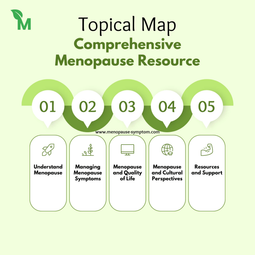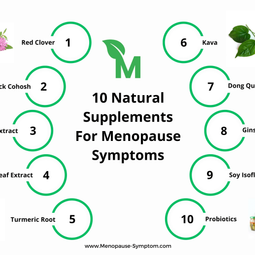Navigating Menopause
Menopause is a significant milestone in a woman's life, marking the end of her reproductive years. While this transition is natural, it often brings about various physical and emotional changes. One of the most common concerns for menopausal women is the tendency to gain weight, particularly around the midsection. This phenomenon, often referred to as "menopause belly," can be frustrating and challenging to address.
As estrogen levels decline during menopause, the body's fat distribution tends to shift. Women may notice an increase in abdominal fat, even if their overall weight remains stable. This change in body composition is not just a cosmetic issue; it can also have implications for overall health and well-being.
The Science Behind Menopausal Weight Gain
Several factors contribute to the increased likelihood of weight gain during menopause:
Hormonal changes: The decrease in estrogen can lead to insulin resistance, making it easier for the body to store fat, especially around the abdomen.
Slower metabolism: As we age, our metabolic rate naturally slows down, making it more challenging to maintain a healthy weight.
Muscle loss: The aging process often results in a gradual loss of muscle mass, which further reduces metabolic rate.
Lifestyle factors: Changes in activity levels, dietary habits, and stress can all contribute to weight gain during this period.
Understanding these underlying mechanisms is crucial for developing effective strategies to manage menopausal weight gain, including the use of natural supplements.
The Role of Natural Supplements in Menopause Belly Fat Management
While there's no magic solution for menopausal weight gain, certain natural supplements can support your efforts to maintain a healthy weight and body composition during this transitional period. These supplements work in various ways, from supporting hormone balance to enhancing metabolism and reducing inflammation.
It's important to note that supplements should be used in conjunction with a balanced diet and regular exercise routine for optimal results. They are not a substitute for a healthy lifestyle but can provide additional support in your weight management journey.
Key Nutrients for Menopausal Weight Management
Before diving into specific supplements, let's examine some of the key nutrients that can be beneficial during menopause:
Omega-3 fatty acids: These essential fats have anti-inflammatory properties and may help reduce abdominal fat.
Vitamin D: Often deficient in menopausal women, vitamin D plays a role in metabolism and fat storage.
Calcium: Important for bone health, calcium may also have a modest effect on weight management.
B vitamins: These vitamins are crucial for energy metabolism and can help combat fatigue associated with menopause.
Probiotics: Beneficial bacteria that support gut health and may influence weight management.
Now, let's explore some of the most promising natural supplements for addressing menopause belly fat.
Top Natural Supplements for Menopause Belly Fat
1. Omega-3 Fish Oil
Omega-3 fatty acids, particularly those found in fish oil, have shown promise in supporting weight management during menopause. These essential fats have anti-inflammatory properties and may help reduce the accumulation of visceral fat, the type of fat that tends to accumulate around the abdomen during menopause.
Research has indicated that omega-3 supplementation can improve insulin sensitivity and reduce inflammation, both of which are beneficial for weight management. Additionally, omega-3s may help preserve muscle mass during weight loss, which is crucial for maintaining a healthy metabolism.
Recommended dosage: 1,000-2,000 mg of combined EPA and DHA daily. Always consult with a healthcare provider before starting any new supplement regimen.
2. Green Tea Extract
Green tea has long been celebrated for its potential health benefits, and its extract is a popular supplement for weight management. The active compounds in green tea, particularly epigallocatechin gallate (EGCG), have been shown to boost metabolism and increase fat oxidation.
For menopausal women, green tea extract may be particularly beneficial due to its potential to enhance the effects of exercise on fat burning. Some studies have suggested that green tea extract can help reduce abdominal fat when combined with regular physical activity.
Recommended dosage: 250-500 mg of green tea extract standardized to contain 50% EGCG, taken once or twice daily.
3. Vitamin D
Vitamin D deficiency is common among menopausal women and has been associated with increased body fat and insulin resistance. Supplementing with vitamin D may help improve insulin sensitivity and support healthy body composition.
Some research has suggested that vitamin D supplementation, when combined with a calorie-restricted diet, may enhance weight loss and fat loss in overweight individuals. For menopausal women, maintaining adequate vitamin D levels is crucial not only for weight management but also for bone health and overall well-being.
Recommended dosage: 1,000-2,000 IU daily, or as advised by a healthcare provider based on individual vitamin D levels.
4. Probiotics
The gut microbiome plays a significant role in metabolism and weight management. During menopause, hormonal changes can affect the balance of gut bacteria, potentially contributing to weight gain and metabolic issues.
Probiotic supplements can help restore and maintain a healthy gut microbiome. Some strains of probiotics have been shown to support weight loss and reduce abdominal fat. Additionally, probiotics may help alleviate other menopausal symptoms such as bloating and digestive discomfort.
Recommended dosage: Look for a high-quality probiotic supplement containing multiple strains and at least 10 billion CFUs (colony-forming units) per serving.
5. Maca Root
Maca is a plant native to Peru that has been used traditionally to balance hormones and enhance fertility. For menopausal women, maca may help alleviate various symptoms, including hot flashes and mood swings. Some research suggests that maca may also support healthy weight management during menopause.
While more studies are needed to confirm its effects on weight specifically, maca's potential to balance hormones and reduce stress may indirectly support weight management efforts. Stress reduction is particularly important, as high cortisol levels can contribute to abdominal fat storage.
Recommended dosage: 1,500-3,000 mg daily, divided into two or three doses.
6. Berberine
Berberine is a compound found in several plants and has been used in traditional Chinese and Ayurvedic medicine for centuries. Recent research has shown that berberine may have significant benefits for metabolic health, including improved insulin sensitivity and reduced fat accumulation.
For menopausal women struggling with belly fat, berberine's ability to activate AMPK (an enzyme that plays a key role in cellular energy balance) may be particularly beneficial. Some studies have shown that berberine supplementation can lead to reductions in body weight and improvements in lipid profiles.
Recommended dosage: 500 mg taken 2-3 times daily before meals. Start with a lower dose and gradually increase to assess tolerance.
7. Magnesium
Magnesium is an essential mineral that plays a crucial role in over 300 enzymatic reactions in the body. During menopause, magnesium levels can decline, potentially contributing to insulin resistance and weight gain. Supplementing with magnesium may help improve insulin sensitivity and support healthy metabolism.
Additionally, magnesium can help alleviate other menopausal symptoms such as sleep disturbances and mood changes, which can indirectly impact weight management efforts.
Recommended dosage: 300-400 mg daily, preferably in the form of magnesium glycinate or citrate for better absorption.
Implementing a Holistic Approach to Menopause Belly Fat Management
While natural supplements can be valuable tools in managing menopause belly fat, it's essential to approach this issue holistically. Supplements should be viewed as part of a comprehensive strategy that includes:
1. Balanced Nutrition
Focus on a diet rich in whole foods, including:
Lean proteins to support muscle mass and satiety
Fiber-rich fruits and vegetables for gut health and fullness
Healthy fats, particularly omega-3s, for hormone balance and inflammation reduction
Complex carbohydrates for sustained energy and blood sugar control
2. Regular Physical Activity
Incorporate a mix of exercises:
Strength training to preserve and build muscle mass
Cardiovascular exercises for heart health and calorie burning
Flexibility and balance work to maintain overall fitness and reduce injury risk
3. Stress Management
Implement stress-reduction techniques such as:
Meditation or mindfulness practices
Yoga or tai chi
Deep breathing exercises
Regular relaxation time
4. Adequate Sleep
Prioritize sleep hygiene:
Aim for 7-9 hours of quality sleep per night
Establish a consistent sleep schedule
Create a relaxing bedtime routine
Minimize screen time before bed
5. Regular Health Check-ups
Maintain regular appointments with healthcare providers:
Monitor hormone levels and overall health
Discuss any concerning symptoms or side effects
Adjust supplement and treatment plans as needed
Conclusion: Embracing a Comprehensive Approach to Menopausal Health
Managing menopause belly fat is a common concern for many women navigating this life transition. While natural supplements can provide valuable support, they are most effective when integrated into a holistic approach to health and wellness.
The supplements discussed in this article – omega-3 fish oil, green tea extract, vitamin D, probiotics, maca root, berberine, and magnesium – each offer unique benefits that can contribute to weight management and overall well-being during menopause. However, it's crucial to remember that individual responses to supplements can vary, and what works for one person may not be as effective for another.
Before incorporating any new supplements into your routine, it's essential to consult with a healthcare provider, particularly if you have any pre-existing health conditions or are taking medications. A healthcare professional can help you determine the most appropriate supplements and dosages based on your individual needs and health status.
Ultimately, the journey through menopause is unique for each woman. By combining targeted supplementation with a nutritious diet, regular exercise, stress management, and good sleep habits, you can create a comprehensive strategy for managing menopause belly fat and promoting overall health and vitality during this important life stage.
Source: Team MPS compiled, analyzed and wrote. Please dont reup without source of us. Many thanks.
Remember, the goal is not just to address a single symptom but to nurture your body holistically as it transitions through menopause. With patience, persistence, and the right support, you can navigate this change with grace and emerge feeling confident, healthy, and empowered.




